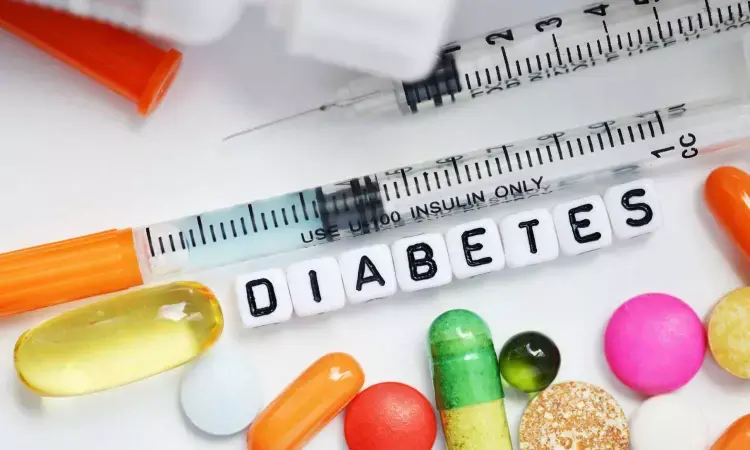- Home
- Medical news & Guidelines
- Anesthesiology
- Cardiology and CTVS
- Critical Care
- Dentistry
- Dermatology
- Diabetes and Endocrinology
- ENT
- Gastroenterology
- Medicine
- Nephrology
- Neurology
- Obstretics-Gynaecology
- Oncology
- Ophthalmology
- Orthopaedics
- Pediatrics-Neonatology
- Psychiatry
- Pulmonology
- Radiology
- Surgery
- Urology
- Laboratory Medicine
- Diet
- Nursing
- Paramedical
- Physiotherapy
- Health news
- Fact Check
- Bone Health Fact Check
- Brain Health Fact Check
- Cancer Related Fact Check
- Child Care Fact Check
- Dental and oral health fact check
- Diabetes and metabolic health fact check
- Diet and Nutrition Fact Check
- Eye and ENT Care Fact Check
- Fitness fact check
- Gut health fact check
- Heart health fact check
- Kidney health fact check
- Medical education fact check
- Men's health fact check
- Respiratory fact check
- Skin and hair care fact check
- Vaccine and Immunization fact check
- Women's health fact check
- AYUSH
- State News
- Andaman and Nicobar Islands
- Andhra Pradesh
- Arunachal Pradesh
- Assam
- Bihar
- Chandigarh
- Chattisgarh
- Dadra and Nagar Haveli
- Daman and Diu
- Delhi
- Goa
- Gujarat
- Haryana
- Himachal Pradesh
- Jammu & Kashmir
- Jharkhand
- Karnataka
- Kerala
- Ladakh
- Lakshadweep
- Madhya Pradesh
- Maharashtra
- Manipur
- Meghalaya
- Mizoram
- Nagaland
- Odisha
- Puducherry
- Punjab
- Rajasthan
- Sikkim
- Tamil Nadu
- Telangana
- Tripura
- Uttar Pradesh
- Uttrakhand
- West Bengal
- Medical Education
- Industry
Diabetes Patients with Frailty more vulnerable to Adverse Effects related to SGLT-2 Inhibitors

The prevalence of type 2 diabetes mellitus (T2DM) is increasing globally, with the highest increases anticipated to be in older populations.
Examining benefits and risk of SGLT-2 inhibitors in older diabetes patients with frailty, researchers have found in a new study that SGLT-2 inhibitors were associated with significantly higher complication rates in the patients with frailty (40%) than in the non-frail patients (9.5%). Therefore SGLT-2 Inhibitors should be used with caution in older frail adults, suggested researchers.
Based on glycemic needs of patients, Sodium-glucose transporter-2 (SGLT-2) inhibitors are used as a second-line therapy in type 2 diabetes mellitus (DM) either with or without metformin. But there is uncertainty on the safety and efficacy of SGLT-2 inhibitors in older adults, and there is no sufficient evidence on it's in the use of older adults with DM.
By reviewing patients records retrospectively, forty-one patients with DM, who started a new SGLT-2 inhibitor between 2019 and 2021, were included in the study. Demographic features, components of comprehensive geriatric assessment, laboratory values including glycosylated hemoglobin (HbA1c), renal functions, and urinary analysis were recorded. Complications regarding dehydration, genitourinary infections, acute renal failure, and emergency department admission with euglycemic ketoacidosis or serious infection related to SGLT-2 inhibitors were also documented.
It was found that the he mean age of participants was 69 ± 5.3 years, and 20 patients were living with frailty via the clinical frailty scale. The median follow-up time was 5.0 (3.0–7.0) months. The mean ± SD HbA1c before SGLT-2 inhibitors was 8.56 ± 2.12%, and after treatment, it was 8.13 ± 1.25% in patients living with frailty (p > 0.05). HbA1c level before SGLT-2 inhibitor treatment was observed as 8.87 ± 2.08%, and it was 7.44 ± 0.87% after the treatment among non-frail patients (p < 0.05).
Complication rates related to SGLT-2 inhibitors were significantly higher in the patients living with frailty than in the non-frail patients (40% vs 9.5%, respectively p < 0.05).
The researchers therefore concluded that Patients living with frailty are more vulnerable to adverse effects of SGLT-2 inhibitors, and their benefits are limited. Therefore, it should be used with caution in older adults with frailty. Longitudinal prospective studies should be conducted to support our findings.
For further reference log on to
Oytun, M.G., Ceylan, S., Koca, M. et al. Benefits vs risks: SGLT-2 inhibitors in older adults living with frailty: a retrospective study from a university hospital. Int J Diabetes Dev Ctries (2023). https://doi.org/10.1007/s13410-023-01175-7
BDS, MDS
Dr.Niharika Harsha B (BDS,MDS) completed her BDS from Govt Dental College, Hyderabad and MDS from Dr.NTR University of health sciences(Now Kaloji Rao University). She has 4 years of private dental practice and worked for 2 years as Consultant Oral Radiologist at a Dental Imaging Centre in Hyderabad. She worked as Research Assistant and scientific writer in the development of Oral Anti cancer screening device with her seniors. She has a deep intriguing wish in writing highly engaging, captivating and informative medical content for a wider audience. She can be contacted at editorial@medicaldialogues.in.
Dr Kamal Kant Kohli-MBBS, DTCD- a chest specialist with more than 30 years of practice and a flair for writing clinical articles, Dr Kamal Kant Kohli joined Medical Dialogues as a Chief Editor of Medical News. Besides writing articles, as an editor, he proofreads and verifies all the medical content published on Medical Dialogues including those coming from journals, studies,medical conferences,guidelines etc. Email: drkohli@medicaldialogues.in. Contact no. 011-43720751


